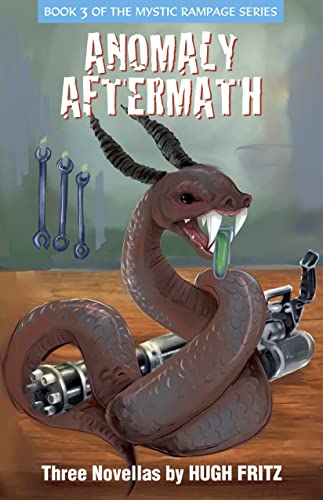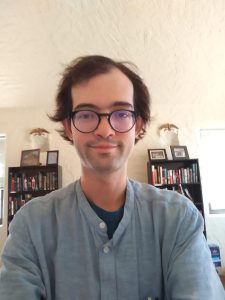Hugh Fritz is pleased to introduce us to Anomaly Aftermath, the third novella in his Mystic Rampage series. He has also given us information about “Developing a Pitch for a Book-to-Film Adaptation,” which we will all find very useful. Here’s Hugh Fritz:
“Developing a Pitch for a Book-to-Film Adaptation.”
by Hugh Fritz
My books have been available publicly for a few years now and I’ve been considering future directions. It’s been described as a superhero novel so sometimes I investigate ways of adapting it into a comic book series or graphic novel. That hasn’t gained any traction because finding an artist has been challenging and even if I did find someone willing to collaborate, there would be red tape to go through with the publishing house. I still think it would be a fun idea, but it’s one that’s always on the back burner.
Film adaptation is another option that’s been on my mind for a while. It started when I submitted Made to Be Broken to a contest called Book Pipeline. The winner of that contest receives help writing a script and pitching their ideas to studios. I didn’t win that contest, but I didn’t take that as a reason to abandon the project. It just meant that instead of receiving help, I need to learn about script writing and pitches on my own. Fortunately, this isn’t an entirely unknown territory for me since there are people I can go to for advice. I have family and friends with experience in writing scripts and have even submitted films to festivals.
One of the ways they’ve helped was by setting me up with guidelines for how to develop a pitch deck, which I’ve also heard referred to as a story bible. The document I was led to was a sample pitch deck that used Westworld as an example. It had a page dedicated to each main character with briefings on their backstory and traits, as well as a single-page synopsis of each season. Applying that treatment to my story wasn’t much of an issue. The part that has been an issue has been the use of images. I’ve spent years relying on text to set the tone, but pitch decks for movies and shows seem to use as little text as possible. In the sample pitch deck, the bulk of it consisted of screenshots from Westworld: the lab, the wilderness, the saloons, etc. It made for an amazing sample, but it didn’t help me much. I don’t have any images of my Genie characters using magic, or the Old Ticker firing his spellcasting revolvers. I’ve resorted to using Google to find stock images. I cite them all, of course. I’m a chemistry student so I appreciate the importance of referencing everything. Unfortunately, being publicly available images, the quality isn’t as good as the ones used in the sample pitch deck, and some of them only loosely relate to the story’s content. I can’t help but feel that if I ever submit a pitch deck, the images will be a detriment, so I still need to think like a novelist and focus on my character description portions as the main selling points.
Since I’m learning how to develop a pitch, I figured I should practice writing a script as well. It’s been a refreshing challenge because in a way it feels like I’m learning how to write all over again. The character development and plot structure carry over, and I’ve written all-dialogue stories as exercises before so writing lines for characters isn’t new. The main difference for me has been stepping aside in my position as the omniscient narrator. The first line in Made to Be Broken is: “It was late August in Chicago, where Darren Raleigh, unemployed and dressed in rags, stood on a curb.” It provides a time, place, character name, and some indication of that character’s status. In a script, the same information is harder to reveal. Before I got to any lines of dialogue, I spent a long time just experimenting with how to set the scene. I thought of showing a clear sky and cutting to people playing on a beach to establish the season, then panning to Lake Shore Drive to establish the setting is in Chicago (at least I hope viewers would recognize that), and then finally zooming in on Darren. It’s just a small portion of the script, but I still go back to revise it because I consider using things like parks instead of a beach, or buildings instead of roads. It’s also my first script so I’m not sure if I’m using the terms properly and I’m worried that if I ever submit it people will think it sounds like gibberish. I doubt this is a unique problem because I faced a similar obstacle when I started writing novels. I’d focus on one paragraph and assess every word, proofread it until I was certain there would be no confusion from any reader. I’ve heard that referred to as revision addiction and I know I’m not the only novelist who has succumbed to it. Once I got over it my productivity on the Mystic Rampage series improved, and I’m sure the same will happen eventually with script writing. This is still an early project, and it isn’t my main one at the moment so it will take a while, but it’s still fun just as a new thing to try. If nothing else it’s sure to keep me busy for a long time.
***
Thank you, Hugh. I hope your essay will produce a huge amount of comments. It’s something all writers can learn from.
About Anomaly Aftermath:
Soleil is lost in time, launched through history at the hands of the Old Ticker. Now he is out
of his element. He must adapt to his new home, hope it’s possible to return to his original
time, and pray for a chance to correct some mistakes along the way.
Tyrell knows Flarence killed Darren. He wants revenge, though a mere human with limited
resources has no chance of harming a Genie. But Roy’s body is failing to the point that not
even Genie blood can sustain him. The cause of Roy’s slow death may give Tyrell the
opportunity he needs to make Flarence suffer.
The Old Ticker’s designs have been leaked. Now they rest in deadlier hands and more
mischievous minds. A pair of spell-casting revolvers were nothing compared with the new
weapons being developed in secret. The Genies may have met their match when a scientist
emerges armed with the most devastating firearm the world has ever known.
These three novellas are the culmination of the Mystic Rampage series—historical fiction,
contemporary action, and near-future science fiction. Connecting them all is their shared
theme of overcoming regrettable decisions to forge a brighter future.
Anomaly Aftermath is available in print and as an ebook at Amazon. You can add it to your
GoodReads reading list as well.
Hugh Fritz is thrilled to have completed his Mystic Rampage trilogy, a project eight years in
the making. While writing the series he has outlined and written rough drafts of other stories
ranging from horror to romance. He is currently bouncing between his works in progress,
deciding which one should get his full attention. Whatever comes next will assuredly be a
step in a whole new direction.
Find Hugh Online:
Author website: http://www.hughfritz.com/
Blog site: http://www.hughfritz.com/blog
Facebook: https://www.facebook.com/profile.php?id=100063563318857
Amazon: https://www.amazon.com/stores/Hugh-
Fritz/author/B072BRDLDD?ref=ap_rdr&store_ref=ap_rdr&isDramIntegrated
=true&shoppingPortalEnabled=true





Speak Your Mind